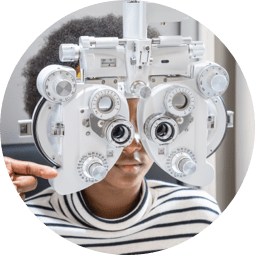Diabetes Can Affect Your Eyes & Sight
Diabetes is a chronic health condition affecting how the body uses or produces insulin—a hormone regulating blood sugar or glucose. When blood sugar levels are uncontrolled, it can severely impact your health in many ways, including vision loss. People with diabetes have a 25% greater risk of blindness. Yet, most vision loss can be prevented with early detection and treatment. Annual diabetic eye exams can help preserve your sight.



How Diabetes Affects Eye Health
Blood sugar levels rise when the body stops responding to or producing insulin. Over time, the higher levels affect blood vessel health. It can cause the blood vessels to weaken or grow abnormally.
The back of the eye contains tiny blood vessels supplying nutrients to the retina (a thin layer of light-detecting tissue at the back of the eye). When blood sugar rises, the blood vessels supplying the retina can swell and leak, decreasing blood flow to the eye. New, abnormal blood vessels may develop under the retina, further affecting vision.

Diabetic Eye Disease
People with diabetes can develop diabetic eye disease—a group of eye disorders affecting eye health and vision. Uncontrolled blood sugar levels contribute to weakened or damaged blood vessels in the eye, increasing the risk of cataracts, diabetic retinopathy, diabetic macular edema, and glaucoma.
Cataracts
A cataract is a cloudy or opaque spot on the eye’s clear lens. The flexible lens changes shape to help focus light inside the eye, stretching or shrinking for seeing different distances. When proteins in the lens break down, they clump together—forming a cataract—and reducing the lens’ flexibility. Cataracts worsen over time and can severely impact vision, even blindness.
Cataracts are more common in adults over 55, resulting from natural changes to lens tissue. However, people with diabetes can develop cataracts earlier.
Cataracts cannot be reversed or cured, but there are management options to sharpen vision, like glasses or contact lenses. Additionally, cataract surgery may be recommended in later stages of development to restore sight.
Diabetic Retinopathy
Diabetic retinopathy is a sight-threatening complication of diabetes causing progressive retina damage. Blood vessels in the retina swell and leak, blocking blood flow and decreasing vision.
Symptoms of diabetic retinopathy include:
- Blurred or hazy vision
- Decreased nighttime vision
- An empty or dark spot in central vision
- Seeing floaters, spots, or streaks
Decreasing inflammation and controlling leaking can help prevent vision loss. When diabetic retinopathy worsens, it can be treated with surgery, injections, or laser treatment.
Diabetic Macular Edema
Macular edema is swelling or fluid retention in the macula—oval-shaped tissue in the retina’s center. The macula detects color and fine details. When blood vessels in the retina leak, it causes the macula to swell and thicken, interfering with macula function.
Diabetic macular edema (DME) causes blurry vision, with central or straight-ahead vision worsening over time. Other symptoms include:
- Faded or dull color vision
- Size discrepancies between the left & right eye
- Straight lines appearing wavy or crooked
Controlling fluid leakage can help reduce swelling and prevent vision loss. Managing your diabetes through diet, medications, or lifestyle changes can help. Additional DME treatments include eye drops, injections, surgery, and laser treatment.
Glaucoma
Glaucoma is a group of eye disorders resulting in optic nerve deterioration. The optic nerve sends visual information from the retina to the brain. When the nerve fibers are damaged, it can significantly reduce vision, eventually causing blindness.
There are multiple forms of glaucoma, but the most common is open-angle glaucoma. It’s caused by increased eye pressure. With diabetes, damaged blood vessels leak fluid inside the eye. As fluid accumulates, pressure increases and gradually damages the optic nerve.
People with glaucoma often have few symptoms until nerve loss significantly decreases peripheral vision. Although optic nerve damage cannot be reversed, treatment can help prevent further vision loss.

What to Expect from a Diabetic Eye Exam
Diabetic eye exams share similarities to a comprehensive eye exam—both evaluate eye health and vision with various tests. However, diabetic eye exams focus on known complications of diabetes, so optometrists can complete a more thorough examination of tissue affected by diabetes.
Some of the diagnostic tests you can expect are:
- Tonometry: A tonometer measures eye pressure by briefly and gently tapping the cornea (the eye’s front surface). The device evaluates how much pressure is needed to flatten the surface to determine intraocular pressure (IOP). High IOP is associated with glaucoma.
- Digital Imaging or Fundus Photography: The fundus is the back surface of the eye, including the retina, macula, optic nerve, and blood vessels. High-definition images of the back of the eye capture fine details, from tissue swelling to scar tissue, to help diagnose even minor changes.
- Visual Field Testing: Looking for blindspots can help optometrists evaluate your peripheral vision—what you can see around you without moving your eyes. Peripheral vision loss is a common symptom of diabetic eye disease.

Insight into Eye Health
Diabetes can complicate your health in many ways, so it helps to have insight into some microscopic but significant changes. Your optometrist can take a close look at blood vessel changes to help diagnose and manage your eye health.
We want to support your vision. Book your regular diabetic eye exam at Advanced Eye Center.

Our Featured Services







